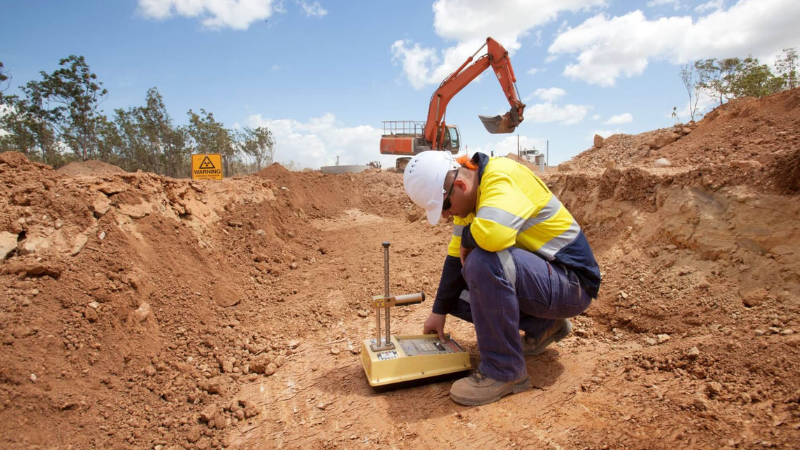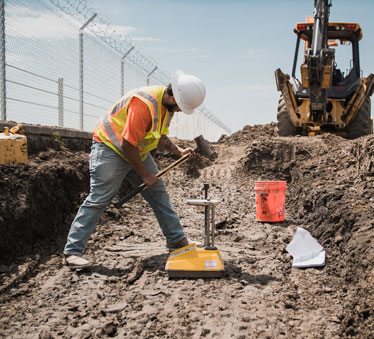Critical Skills for Thriving in the Geotechnical Industry Today
Critical Skills for Thriving in the Geotechnical Industry Today
Blog Article
A Thorough Review of the Secret Duties of Geotechnical Engineers in Site Characterization and Ground Renovation Methods for Design Solutions
Geotechnical engineers are essential to the successful implementation of design projects, tasked with the essential duties of site characterization and the application of ground enhancement techniques. Their work includes a comprehensive evaluation of subsurface conditions, employing different testing techniques to recognize soil and rock buildings.
Duty of Geotechnical Designers
Geotechnical engineers play a critical function in the design and building of framework by assessing the actions of dirt and rock underneath the surface - geotechnical eng. Their responsibilities incorporate examining subsurface conditions to inform layout choices that guarantee structural security and safety. By conducting in-depth analyses of soil residential properties, consisting of shear strength, compressibility, and permeability, geotechnical engineers give vital information that influences the choice of appropriate building products and techniques
In enhancement to analyzing soil technicians, geotechnical engineers are charged with recognizing potential dangers such as landslides, sinkholes, and ground negotiations. Their experience helps alleviate dangers connected with these geotechnical phenomena, thus securing both the setting and public safety. They additionally team up closely with other engineering techniques, ensuring that geotechnical considerations are integrated into general task layout.
Furthermore, geotechnical engineers participate in the assessment of existing structures, supplying referrals for retrofitting and fixings when necessary. Their comprehensive understanding of soil-structure interaction is necessary for the growth of lasting framework remedies. Overall, the role of geotechnical engineers is essential to the successful realization of building jobs, ensuring they are safe, resilient, and compliant with regulative criteria.

Website Characterization Processes
Effective website characterization processes are essential for recognizing the subsurface conditions that affect job design and execution. Geotechnical designers utilize a systematic strategy to collect, review, and translate information concerning soil, groundwater, and rock attributes. This procedure begins with a detailed evaluation of existing literary works and historical site information, offering understandings right into previous site conditions and prospective difficulties.

Data evaluation adheres to fieldwork, where engineers use geostatistical approaches to analyze findings and produce geological designs. Via diligent site characterization, geotechnical designers lay the foundation for effective project execution, lessening unforeseen problems and maximizing source allowance.
Soil and Rock Screening Methods
While comprehending subsurface conditions is essential, the option of appropriate soil and rock testing approaches is just as important for precise evaluation and style. Geotechnical designers use a variety of testing strategies to evaluate the mechanical and physical properties of soil and rock materials.
Laboratory examinations, such as Atterberg restrictions, grain dimension analysis, and unconfined compressive strength examinations, give important data on soil actions under different dampness conditions and packing scenarios. These examinations help determine dirt category and forecast negotiation or shear stamina qualities essential for structure layout.
In-situ screening techniques, including Standard Infiltration Examinations (SPT), Cone Penetration Tests (CPT), and stress meter examinations, enable engineers to gather information straight from the ground. These methods offer valuable understandings into the dirt's thickness, consistency, and stratification without the need for substantial tasting.
Rock screening typically entails core sampling and lab evaluation to evaluate residential or commercial properties like uniaxial compressive toughness and rock quality classification (RQD) With each other, these soil and rock screening techniques allow geotechnical engineers to make educated decisions regarding site-specific challenges, making certain the safety and security and stability of design options.
Ground Improvement Strategies
Ground improvement strategies are vital for enhancing the engineering residential or commercial properties of soil, thus boosting its load-bearing capability and minimizing negotiation. These methods are critical in attending to obstacles presented by weak or bothersome soils, which can significantly impact the security and resilience of frameworks.
Various ground enhancement methods are utilized, consisting of compaction, grouting, and dirt stablizing. Grouting, on the other hand, involves injecting a liquid product into the ground to fill up gaps and enhance soil cohesion.
Dirt stablizing includes a variety of methods, from chemical ingredients to mechanical therapies, focused on improving the dirt's resistance to erosion and contortion. Strategies such as lime stabilization or cement mixing change the residential properties of the dirt at a fragment degree, improving its general performance.
Significance of Geotechnical Assessments
Geotechnical evaluations play an important role in the preparation and style of engineering tasks, as they supply vital info about the subsurface problems. Comprehending dirt buildings, rock developments, groundwater levels, and possible geohazards is crucial for making sure the stability he said and safety of structures. These analyses make it possible for engineers to make educated decisions regarding site selection, layout criteria, and building methods.
The relevance of geotechnical assessments extends beyond first task stages; they are crucial in danger management and price efficiency. By recognizing prospective concerns early, such as soil settlement, incline instability, or excessive groundwater, designers can devise ideal mitigation approaches, decreasing the possibility of structural failures and expensive delays. These analyses support compliance with regulatory demands and improve the sustainability of design techniques.

Verdict
In verdict, geotechnical engineers are vital to making sure the safety and security of engineering tasks with comprehensive website characterization and ground enhancement techniques. geotechnical industry. Their systematic strategy to examining subsurface conditions, combined with their referrals for effective ground modification, significantly boosts soil residential or commercial properties and load-bearing capacity. The know-how of geotechnical engineers not just facilitates enlightened task preparation however he has a good point likewise makes sure conformity with regulations and promotes efficient interaction amongst stakeholders, ultimately adding to effective design end results
Geotechnical engineers play a critical function in the style and building and construction of infrastructure by examining the actions of dirt and rock under the surface area. By conducting comprehensive analyses of soil homes, consisting of shear compressibility, strength, and permeability, geotechnical engineers provide vital information that influences the choice of proper building and construction products and strategies.
In addition to evaluating soil auto mechanics, geotechnical pop over here engineers are charged with recognizing potential risks such as landslides, sinkholes, and ground negotiations. Geotechnical designers employ a methodical technique to collect, review, and interpret information pertaining to soil, rock, and groundwater features. By determining prospective concerns early, such as dirt settlement, incline instability, or too much groundwater, engineers can create ideal mitigation strategies, reducing the possibility of pricey delays and architectural failures.
Report this page